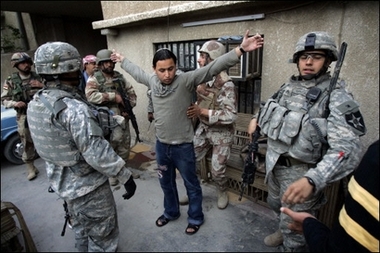Khalilzad: US patience 'running out'
(AP)Updated: 2007-03-26 21:25
BAGHDAD - The departing US ambassador said on Monday that he believes Iraq is heading in the right direction but cautioned that Iraqi leaders must understand that US voters are increasingly impatient with the war.
 An Iraqi man holds his arms up as US soldiers search him for weapons in the predominantly Sunni al-Dora neighborhood of southern Baghdad. [AFP]  |
"I know that we are an impatient people, and I constantly signal to the Iraqi leaders that our patience, or the patience of the American people, is running out," said the Afghan-born Khalilzad, who has been nominated by President Bush as American ambassador to the United Nations.
Khalilzad's cautiously optimistic assessment on security coincided with the eruption of sectarian violence in a string of mixed Sunni-Shiite towns south of the capital Monday and over the weekend.
In Iskandariyah, 30 miles south of Baghdad, authorities slapped an indefinite curfew after two people were killed and two others were wounded in sectarian clashes sparked by an attack Monday on a Sunni mosque by suspected Shiite militants, police said.
Iraqi and US forces sealed off the area where the mosque is located, but clashes erupted elsewhere in the town.
The mosque was slightly damaged by rocket-propelled grenades fired by the assailants.
In Mahaweel, a mainly Shiite town 35 miles south of Baghdad, a bomb planted near a Sunni mosque went off Monday morning, damaging the building but causing no casualties, police said.
The targeting of the mosques came one day after suspected Shiite militants attacked a Sunni mosque in Haswa, a town near both Iskandariyah and Mahaweel. The attack was in apparent retaliation for a suicide truck bombing against a Shiite mosque that killed 11 people on Saturday, also in Haswa.
Aides to Prime Minister Nouri al-Maliki have said that Washington has signaled that he must make progress on a series of benchmark legislative and political measures by June 30 or face a withdrawal of American support for his government.
The United States has denied making the threat but Khalilzad was clear Monday that al-Maliki was under heavy US pressure to move rapidly on several issues, especially a law that would provide a fair distribution of Iraqi oil wealth among all ethnic and sectarian groups, a measure that is especially important to the White House.
He also said the Iraqis need to act on political and sectarian reconciliation between Sunnis and Shiites, and on amending the constitution to make it more palatable to the Sunnis. Despite repeated promises of quick action from the Iraqis and heavy pressure from the Americans, those measures still await action in parliament.
Khalilzad also said US contacts with Sunni insurgents were ongoing and he noted progress in splitting some Sunni tribes away from the insurgency and from al-Qaida in Iraq in particular.
"There is a lot more that needs to be done," Khalilzad told the news conference.
In scattered violence Monday across Iraq, gunmen in two cars fatally shot an off-duty police officer walking near his home in the northern city of Mosul, according to Brig. Mohammed al-Wagaa, director of police operations in Ninveh province of which Mosul is the capital.
In Baghdad, one person was killed and three were wounded when three mortar shells hit a neighborhood in the mainly Sunni Dora district, according to police.
In the southeastern district of Zafaraniyah, a roadside bomb targeting a police patrol went off at 10:55 am, killing a police officer and wounding three, including a police captain, police said. Two civilians also were injured.
|
||
|
||
|
|